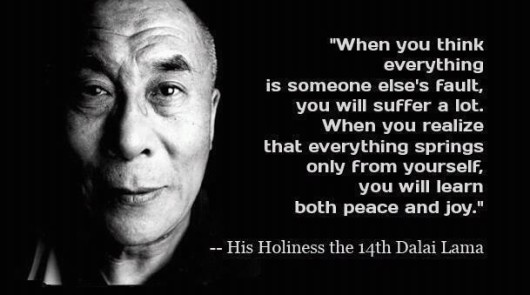The traditional Eastern view of life may be summed up as follows:

The Western view, on the other hand, might be expressed in the words of Shakespeare:
To be or not to be, that is the question.
Whether 'tis nobler in the mind to bear the slings and arrows of an outrageous fortune,
Or to take up arms against a sea of troubles
And, by opposing, end them.
A modern version of this view is expressed in the following video:
Who is right? If we were never willing "to take up arms against a sea of troubles," slavery would still exist, wives would always remain submissive to abusive husbands, and democracy would never have come into existence. On the other hand, for a small child growing up in an alcoholic and abusive home, a person toiling in dead-end jobs with no hope of getting another one, a prisoner serving a life sentence, or a patient in a hospice with a terminal illness, their only hope may be to turn inward in the quest for happiness and inner peace.
For most of us, one answer may be appropriate in one situation or time in life, while the other answer may be appropriate at another time. I once had a Buddhist client with multiple personalities, who told me that in Tibetan Buddhism you choose your parents according to what they can teach you. "I must have had to learn an awful lot," she told me. She sure did!
A practical guide to making the appropriate choice is suggested in the following "Serenity Prayer" by theologian Reinhold Niebuhr, which has been adopted by Alcoholics Anonymous and other twelve-step organizations:
God, grant me the serenity to accept the things I cannot change,
The courage to change the things I can,
And wisdom to know the difference.
Who is right? If we were never willing "to take up arms against a sea of troubles," slavery would still exist, wives would always remain submissive to abusive husbands, and democracy would never have come into existence. On the other hand, for a small child growing up in an alcoholic and abusive home, a person toiling in dead-end jobs with no hope of getting another one, a prisoner serving a life sentence, or a patient in a hospice with a terminal illness, their only hope may be to turn inward in the quest for happiness and inner peace.
For most of us, one answer may be appropriate in one situation or time in life, while the other answer may be appropriate at another time. I once had a Buddhist client with multiple personalities, who told me that in Tibetan Buddhism you choose your parents according to what they can teach you. "I must have had to learn an awful lot," she told me. She sure did!
A practical guide to making the appropriate choice is suggested in the following "Serenity Prayer" by theologian Reinhold Niebuhr, which has been adopted by Alcoholics Anonymous and other twelve-step organizations:
God, grant me the serenity to accept the things I cannot change,
The courage to change the things I can,
And wisdom to know the difference.
